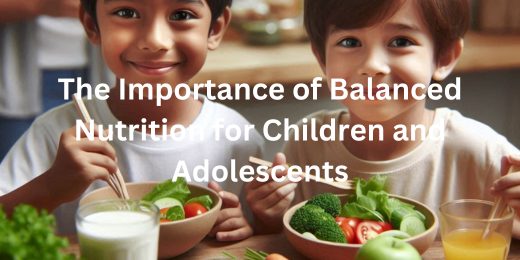
The Importance of Balanced Nutrition for Children and Adolescents
Child nutrition
Why Growing Bodies Need More Food
Children and adolescents experience rapid physical growth, requiring more nutrients than adults to build strong bodies. Their high energy levels demand ample calories to fuel their activities, making a balanced diet essential. Additionally, a child’s developing immune system relies on essential vitamins and minerals found in nutritious food to protect against illnesses.
Kids require a diet high in child nutrition to ensure adequate development and growth. This includes a variety of foods from all food groups to provide the necessary nutrients for building strong bones, muscles, and a healthy immune system. Children’s diets should be nutritious since it promotes general health and lays the groundwork for lifetime healthy eating habits.
By prioritizing healthy eating for kids, parents can help their children reach their full potential. A well-nourished child is more likely to have higher energy levels, better focus, and a stronger immune system. Encouraging child nutrition from a young age fosters a positive relationship with food and lays the groundwork for a healthy adult life.
Dietary Needs Throughout Childhood and Adolescence
Early Childhood (2-5 years): Young children aged 2 to 5 years need a diverse diet filled with fruits, vegetables, whole grains, dairy products, and lean proteins. Gradually introduce new foods to cultivate healthy eating habits.
Middle Childhood (6-10 years): As children grow from 6 to 10 years old, their appetites increase, demanding larger portions while maintaining a balanced diet. Involving them in food choices and meal preparation fosters a positive relationship with food.
Adolescence (11-19 years): Teenagers aged 11 to 19 years experience rapid growth and hormonal changes, requiring increased calorie intake and specific nutrients like calcium for strong bones. Encourage healthy food choices and responsible eating habits as they gain independence. For children to grow and develop at their best during these phases, proper nutrition is essential.
By prioritizing healthy eating for kids from an early age, parents lay the foundation for a lifetime of well-being. A balanced diet fuels energy, concentration, and immunity, while fostering mindful eating habits.
Calcium and Iron: Essential Minerals for Growing Bodies
Calcium is a vital mineral for building and maintaining strong bones and teeth. Children and adolescents, especially, require ample calcium for their rapid growth. Incorporate calcium-rich foods like milk, yogurt, cheese, leafy green vegetables, and sesame seeds into their daily diet.
Iron is another essential mineral that plays a crucial role in carrying oxygen throughout the body. Growth, intellectual advancement, and endurance capabilities all depend on it. To ensure adequate iron intake, include iron-rich foods such as meat, poultry, fish, beans, lentils, and fortified cereals in your child’s diet. For better iron absorption, pair these foods with vitamin C-rich fruits like oranges, guavas, and berries.
Child nutrition is vital for overall health and development. Providing children with a balanced diet rich in essential nutrients helps them grow, learn, and thrive. By offering a variety of healthy eating for kids options, parents can encourage lifelong healthy habits.
Diet and Infections: A Two-Way Street
Malnutrition weakens the immune system, making children and adolescents more vulnerable to infections. A balanced diet strengthens their body’s natural defences. During illness, children may experience reduced appetite. Offer small, easily digestible meals and plenty of fluids to prevent dehydration and support recovery.
After recovering from an illness, focus on providing nutrient-rich foods to replenish lost energy and rebuild the immune system. Encourage a variety of healthy eating for kids to ensure they receive essential vitamins and minerals.
A strong connection exists between child nutrition and infection prevention. By prioritizing a balanced diet, parents can help protect their children’s health and support their overall well-being.
Avoiding Unhealthy Habits
Packaged foods often contain excessive amounts of unhealthy fats, sugars, and sodium, offering little nutritional value. Prioritize fresh, whole foods for a healthier diet. Fad diets can be harmful for growing bodies, as they often lack essential nutrients. Focus on a balanced diet instead to support overall health.
Regular physical activity complements healthy eating for kids. Encourage your child to engage in enjoyable physical activities to maintain a healthy weight and improve overall well-being.
By promoting child nutrition and discouraging unhealthy habits, you can help your child develop a positive relationship with food and lay the foundation for a lifetime of good health.
Building Healthy Habits for Life
Sharing meals as a family creates a positive and enjoyable dining experience. Regular family meals foster bonding and encourage healthy eating habits. Involving children in meal planning and preparation increases their interest in and appreciation for healthy foods.
Children look up to their parents and other carers as examples to emulate. By making healthy food choices and demonstrating positive eating habits, adults influence children’s preferences and behaviours.
Building a strong foundation of child nutrition and healthy eating for kids starts at home. Creating a supportive environment and leading by example helps children develop lifelong healthy habits.